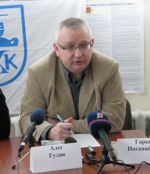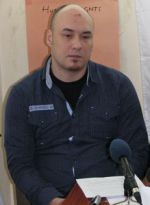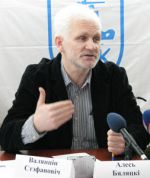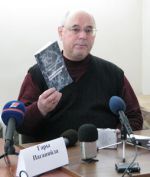Elections 2010 – still following the old scenario
The atmosphere of fear and disappointed hopes on democratic effect of the amendment of the electoral legislation – this is the evaluation given by human rights defenders to the beginning of the campaign on elections to the local Soviets of 26th Convocation.
If there was political will…
The Belarusian Helsinki Committee and the Human Rights Center Viasna started monitoring the pace of the electoral process in 20 large cities of Belarus where the majority of the electorate dwells. The Human rights defenders for free elections campaign is a long-time one and will observe all stages of the electoral process.
’It is important to watch the practical application of the law and the background of the present electoral campaign, because real fair elections can take place only with the condition of respect to civil rights and liberties, ‘ pointed Aleh Hulak, Chairperson of the Belarusian Helsinki Committee. ‘People should have the opportunity to form their opinion and freedom to decide whether to go voting or no. Besides, the votes need to be calculated correctly. All conclusions and recommendations for the future should be made with account of these factors.
The present electoral campaign is distinguished by amendments in the Electoral Code and the monitoring will make an emphasis on registering the impact of the amendments on the electoral process.’
In general, human rights defenders characterize the amendments as positive. At the same time, Aleh Hulak underlines that ‘not all recommendations of national observers OSCE and the Venice Commission were reflected in the Electoral Code. However, quite democratic elections could be conducted even under the old legislation, if there was a political will for it. If such political manifests this time, it will be easier to realize it with the aid of the amended legislation.’
Do what thou wilt
By the way, amendments to the Electoral Code guarantee that representatives of civil associations of and political parties must comprise 1/3rd of an election commission, whereas the presence of state officers in the commissions is limited by 1/3rd as well. The norm according to which the organ that established the commission had the right to nominate its representative to it was removed. The subjects who nominated their representatives to a commission got the right to be present at the sittings on establishment of the commission. New legislation also gives the option of appealing in court against decisions of a state organ on establishment of a commission. Human rights defenders pay attentions to all these aspects while watching the electoral situation.
Nevertheless, the preliminary data on forming of territorial commission show that in many regions nominees from democratic parties weren’t included in elections commissions for incomprehensible reasons. There were many reports about the establishing organs failing to inform the subjects who nominated their representatives, about the place and time of their sittings for forming the commissions, which makes obscure the actual circumstances of forming the commissions.
’The hope that the quota for representatives of civil organizations and political parties can guarantee a full-scale presence of democratic parties in the commissions doesn’t seem to come true so far,’ stated Valiantsin Stefanovich, lawyer of Human Rights Center Viasna. ‘Earlier commissions also included representatives of the civil associations and parties that were predominantly pro-governmental. This tendency continues at the present elections. Members of commissions nominated by parties comprise just 1.1% from the total number of members of commissions. It can be explained by the fact that many parties don’t have the appropriate lower structures that have the state registration, or aren’t registered with the state at all. For instance, the Belarusian Christian Democracy Party is unregistered and correspondingly had no opportunity to nominate its representatives to electoral commissions. As a result, its members had to collect signatures for their nomination to the commissions. Only three out of 40 BCD candidates were included in election commissions.’
Valiantsin Stefanovich predicts that political parties will be more active during the nomination of candidates to precinct commissions.
Guide for complainants
The Belarusian Helsinki Committee prepared in cooperation with specialists in the sphere of electoral legislation a small corpus of recommendations for appealing against violations of the electoral legislation. Copies of this brochure were submitted to the Supreme Court, the Constitutional Court, General Procuracy and election commissions so that these organs could present their opinions on the content of the book. The guide includes about 30 sample complaints to election commissions, procuracies and courts.
’In this compilation the practice of appealing is considered at a wider scale than allowed by provisions of the Electoral Code,’ said Hary Pahaniaila, BHC lawyer. ‘Earlier the courts didn’t accept the complaints if the possibility of appealing against a certain case wasn’t described in the Electoral Code. During the earlier electoral campaigns the state organs and commissions treated the appealing against decisions of electoral administrations, actions of election commissions and other participants of the electoral process as a mere formality, whereas now everything is more systemized. In 13 cases the code provides the possibility of appealing at court against decisions of electoral administrations and determines the organs with which to lodge the complaints and the legal terms for complaining.’
’It can is quite difficult to appeal against decisions of the state organs forming the commissions, as the legislation doesn’t contain any criteria for appointing members to election commissions, ‘added Valiantsin Stefanovich.
Conducting democratic elections is a difficult task
The human rights defenders are of the opinion that the atmosphere of fear and submissiveness to the authorities still accompanies the electoral process in Belarus.
’The situation for open elections is unfavorable from the very start,’ stated Ales Bialiatski, Chairperson of the Human Rights Center Viasna. ‘This year the Belarusian authorities are put before a difficult task – to hold the local elections at least more or less decently. What openness and political struggle can we speak of, if there are whole oblasts where structures of political parties are registered only in large cities? As a result, the people with whom the authorities have worked side by side for a long time are nominated to the commissions instead.
Creation of new democratic parties in Belarus is virtually impossible. During 2009 there were several attempts to register new political parties: the Belarusian Christian Democracy Party, the Party of Freedom and Progress and the Belarusian Party of Workers. None of them were registered with the state. New democratic parties stopped appearing on the Belarusian political arena in 2003, whereas the number of the existing parties continues decreasing.
Last year, our organization registered cases of dismissal of members of parties from work every moth. The same concerns students, who are expelled from universities because of their active public position. Actually, the authorities encourage depoliticization of the society.
Chairman of Human Rights Center Viasna also pointed at the discrepancy in the scope of information about pro-governmental and oppositional candidates. The questions of non-accreditation of foreign journalists and non-registration of private media remain, which prevents the wide public from being more interested in elections and receiving complete information about the pace of the electoral process.
’We have a Soviet-like centralization system’, states Ales Bialiatski. ‘Civil control over the elections is also a problem, because in the present situation civil associations cannot implement their observer functions to a full extent.’
Human rights defenders for free elections






















